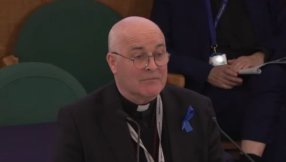
Imagine there was an organisation that existed to provide people in every part of the country with the help they needed, regardless of who they were and of their ability to pay. Would that not be an organisation that deserved universal support and appreciation?
At this point you may think that I am writing about the National Health Service, given that this is a well-known organisation which fits the description that I have just given. However, the organisation I was actually writing about was the Church of England. Just like the NHS, the Church of England exists to provide people across the length and breadth of England with the help they need, regardless of who they are and of their ability to pay.
Given that the two organisations are similar in the ways I have just described, the question that arises is why the NHS receives universal support and appreciation in the way that the Church of England does not. On 5 July this year the NHS was seventy-five years old, and the anniversary was duly marked with a whole series of events, activities and television and radio programmes with the common message that the NHS is a wonderful thing and its creation in 1947 was a great national achievement.
The fact that the NHS's seventy-fifth anniversary was marked in this way is a just reflection of the great contribution that it has made, and continues to make, to British society. The NHS has done an immense amount of good to a huge number of people by helping them with their physical and psychological needs and it is right that everyone should be grateful for this fact.
The Church of England has also done an immense amount of good for the people of England and it has been doing it for a much longer period of time. The Church of England began its ministry to the English people at the end of the sixth century and it has continued that work ever since. During that time it has contributed very significantly to the physical well-being of innumerable generations of English people, but more importantly it has also provided for their spiritual needs through its proclamation of the Christian message, its celebration of the Christian sacraments and its formation of generations of Christian disciples.
Past generations of English people appreciated the Church of England's work. We can see this from the way in which the English landscape is dotted with parish churches, each of which was erected to be a building that would enable the Church to carry out its work more effectively. However, the present generation of English people has largely lost its appreciation for the Church of England's work.
This is shown not only by the decline in the number of people attending Church of England services, but also, for example, by the way in which the Church of England is covered by the media. When was the last time you saw a television programme that explained why the work of the Church is something that is vital to the well-being of the English people and should be celebrated and supported in consequence?
The reason why the Church of England's work is now much less appreciated than it used to be is simple. It is because an increasing number of people in this country no longer acknowledge their need of God. It is obvious to people that they need the work of the NHS. Their bodies and their minds get damaged, and they need the expertise of the NHS to rectify, or at least ameliorate, this situation. What is not obvious to people is why they need the work of the Church of England.
The Church of England exists to enable people to be rightly related to God, but an increasing number of people don't think this is important. They think they can live their lives just fine without God in the picture. Therefore, they feel they don't need what the Church exists to offer.
Furthermore, they don't feel that they need the Church to give them guidance on how to live their lives. They accept the modern mantra that it is up to each individual to decide for themselves how to 'live their best life.' In addition, a lot of younger people are inclined to see the Church of England's failure to give unequivocal support to the LGBTQI+ agenda as meaning that the Church's ethical teaching is not only irrelevant, but positively immoral.
The fact that the Church of England is now much less appreciated than it used to be is undeniable and it presents the Church with a huge challenge. However, in thinking how to respond to this reality The Church of England also needs to recognise that the reasons for this lack of appreciation simply do not make sense. The case for the importance of the Christian message is as strong today as it ever was.
Contrary to the arguments of the 'new atheists' such as Richard Dawkins, careful study of the scientific evidence shows that that there is no chance that the universe could have emerged from nothing, or developed purely by chance, and it also shows that the universe is 'fine-tuned' to produce intelligent carbon-based life forms such as human beings.
The universe is not an accident, and we are not an accident, and both truths point to the existence of a super intelligent designer and creator transcending the natural order (i.e. God). Paul is right; the existence of God is clearly proclaimed through the things that have been made, and to deny this fact is a suppression of the truth (Romans 1:18-20). Furthermore, human beings have been made by their creator as either male or female and designed to have sexual intercourse with members of the opposite sex and beget offspring on that basis.
Careful thought also shows that it makes no sense to say that everyone should simply decide for themselves how they should live. No one really believes this. We can see this from the fact that those who espouse this idea then go on to criticise the way in which other people choose to behave. Human beings have been created with an ineradicable sense that certain things are right and other things are wrong and this only makes sense if there is not only a super intelligent creator God, but also a supremely moral creator God who has a morally good design for how his human creatures should live and has written this as a law in the hearts of each one of them (Romans 2:14-15).
Human experience also shows us that, in the words of the Roman writer Ovid, 'I see and approve the better, but I follow the worse.' The fact that God's law is written in our hearts does not mean that we do it. To quote the Prayer Book 'We have left undone those things which we ought to have done, And we have done those things which we ought not to have done.' We are bad people, and, as CS Lewis has noted in consequence that the moral creator God 'must hate most of what we do.'
Finally, the fact that we have been created with a desire for human fulfilment and for all the wrongs of this world to be made right that is never satisfied in this life points us to the belief that there will be another world in which this desire will be fulfilled. The God who has created us with this desire will see to it that we do not have it in vain.
The Christian message which the Church of England is charged to proclaim corresponds perfectly with the truths I have just outlined.
It tells us that the universe, and we ourselves as human beings, have been created by a super intelligent and supremely moral God and that (contrary to what is suggested by the LGBTQI+ agenda) this God created us as male and female creatures who are designed to have sex and to have children within heterosexual marriage.
It tells us that although we know God exists, we fail to acknowledge him as God or to keep his law and that in consequence we all stand under God's judgement.
It tells us that through the life, death and resurrection of Jesus Christ and the work of the Holy Spirit, God has acted to give us a new start, and to begin to live in obedience to him so that we can live a life of perfect fulfilment in the world to come in which all that is wrong now will be righted.
Finally, it tells us that we have to let what God has done for us become real in our lives, and that we do this by believing the Christian message, being baptised into membership of the Christian Church and living as a disciple of Jesus Christ in the power provided by the Holy Spirit.
All this being the case, the Church of England needs to regain confidence in the importance of its work. Even if it is less appreciated, its work in proclaiming the Christian message is, in fact, even more important than the work of the NHS. People need physical and mental health, but even more fundamentally they need to know the truth about God and how to enter a relationship with him which will last for eternity. The NHS cannot meet this need. The Church of England can, and it needs to be bold and resolute in declaring this fact.













